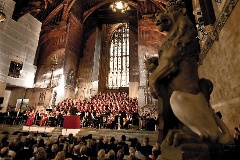Navigationspfad: Startseite > Dokumente > Web- und Textarchiv > Textarchiv
Parliament choirs sing in Westminster Hall

Der britische Parlamentschor und die Musikgemeinschaft des Bundestages beim gemeinsamen Auftritt in Westminster Hall, London. © pa/empics
The words were polite and to the point, but spoken by someone who obviously expected to be obeyed. “Please rise!” said Black Rod in his traditional attire. His voice rang out in Westminster Hall, the most ancient part of the British parliament in the heart of London. The 1,200 members of the audience were happy to do so, showing their respect for John Bercow, the Speaker of the House of Commons, Baroness D’Souza, Lord Speaker of the House of Lords, and their German guests, Bundestag President Norbert Lammert and his wife, who all entered at a stately pace. The audience awaited further instructions, but nothing happened. In the end those in the first row took matters into their own hands and sat down without waiting to be asked. The momentary uncertainty immediately gave way to cheerful murmuring.
Great expectations and professionalism
This incident at the start of the concert on Wednesday, 9 July 2014, by the British Parliament Choir and the German Bundestag Choir was symptomatic of the rest of the evening. Were the two amateur choirs going to manage the ambitious programme, and especially the main work, Felix Mendelssohn Bartholdy’s (1809-1847) “Lobgesang”, with German-language lyrics taken from Martin Luther's translation of the Bible?
The expectations of the audience were high. In addition to numerous British parliamentarians, the guests included a high-ranking delegation from the German Bundestag headed by Norbert Lammert. Among its members were Siegmund Ehrmann (SPD), the chairman of the Committee on Cultural and Media Affairs, and Stephan Mayer (CSU), the chairman of the German British Parliamentary Friendship Group. And the two parts of the “mixed choir” were clearly rather apprehensive.
However, after the first piece, “Zadok the Priest”, which the Anglo-German composer George Frederick Handel (1685-1759), born in Halle an der Saale, composed for King George II in 1727, it was clear that this choral concert was going to be a truly elevating experience. The singers’ performance was highly professional, and at the end the audience rewarded them with a standing ovation, which lasted several minutes, and a great deal of applause. The initial apprehension was long forgotten.
Two historic events in the chronicle of British-German relations
The concert commemorated two historic events, the outbreak of the First World War 100 years ago and the personal union that brought together the British crown and the Kingdom of Hanover 300 years ago. These two dates have had a decisive influence on British-German relations, though of course in very different ways.
Norbert Lammert, the President of the German Bundestag, referred to these events as he extended his greetings to his hosts, saying: “The crucial difference between the two events is that the first was a peaceful transfer of power based on parliamentary decisions.” Before the outbreak of the First World War, in contrast, the parliaments in both Germany and England had played a very subordinate role.
Lammert expresses his gratitude to Britain for its trust
The two world wars which followed had divided Europe. “We Germans know where these wars originated and the impact they had, and we are aware of the role that Germany played,” said Lammert.
He expressed his gratitude to Britain and other European neighbours for the fact that after the Second World War they had learned to trust a new and democratic Germany, reunified 25 years ago. For this reason too, he considered it to be an honour to be present at this concert.
Speakers appreciate Bundestag choir visit
The speakers of both Houses of Parliament appreciated the visit of the German choir. The singers include staff of the Bundestag Administration, the parliamentary groups and the Members’ offices, along with current and former Members of the Bundestag.
Speaker John Bercow said that he was certain this would not be the last joint performance of the two choirs, with Lord Speaker Baroness D’Souza adding that song had brought a new dimension to the inter-parliamentary partnership between the UK and Germany.
Delegation attends Prime Minister’s Questions
The German delegation used its visit to London for numerous discussions with British parliamentarians. The Members of the Bundestag also attended Prime Minister’s Questions, at which David Cameron, the Prime Minister, answers questions in the House of Commons under the watchful eye of Speaker John Bercow. Unlike Question Time in the German Bundestag, which is considered to be a rather lacklustre affair, this is a decidedly lively occasion. All the more reason why it is necessary to prepare carefully for this parliamentary session. The German visitors were also given a glimpse of how this is done.
The visit to London ended with the evening concert, which was an impressive testament to British-German friendship. When the political sphere reaches out to embrace culture, what emerges is political culture. That is the message sent out from Westminster Hall in 2014, a very special year of remembrance. (jbi/14.07.2014)

